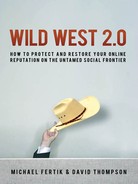251
Glossary
Amoral—Without regard for morals either way; neither immoral nor
moral. The computers that run the Internet are amoral because they
are not programmed to consider the impact of their actions.
Bing—A search engine run by Microsoft.
Communications Decency Act of 1996 (Section 230)—A law from
1996 that has been interpreted to immunize the owners of a website
from lawsuits for attacks caused by users of the website.
Cryptoviral extortion—A specialized form of extortion that uses a
computer virus to render a victim’s files unusable by encrypting
them. The extortionist then offers to sell the key to decrypt (unlock)
the files to the victim.
E-mob—See Electronic lynch mob.
Electronic lynch mob—A group of Internet users who have banded to-
gether to punish some perceived wrongdoer or villain. These mobs
often rush to judgment and may go overboard in their punishment.
E-lynching—The result of an electronic lynch mob.
Google—The largest and most important search engine and the com-
pany that runs it.
Googlebombing—A prank played through Google and other search en-
gines. By manipulating links, pranksters make unrelated pages appear
for popular search terms. The most commonly known example was
that, for some time, a search for “miserable failure” returned a link to
the White House.
Google of Eden—The myth that Google’s search results are a pure re-
flection of reality. This idealized world never existed; Google’s search
results have always been a combination of imperfect human deci-
sions in designing the Google algorithm and imperfect websites cre-
ated by biased (or even vindictive) people.
Google Gone Wild—The self-reinforcing cycle of false negative in-
formation in Google. Many false and scandalous pages attract a large
amount of attention, which confuses the Google algorithm into
thinking that these pages are important, which draws more attention
to them, repeating the cycle endlessly.
Google insurance—It’s not “real” insurance but instead refers to the
power of positive online content to prevent false negative infor -
mation from ruining your reputation. If you create a positive pres-
ence today, that presence will serve as Google insurance against future
attacks.
Googlestuffing—The act of spreading false and negative content in an
attempt to fill (“stuff ”) the first ten links in a search engine search.
Google trail—Evidence that a person or business has been around for
a while, usually in the form of a long history of results in a search en-
gine search.
Google truth—Not the actual truth. Instead, the Google truth is the
stylized caricature version of reality that appears in a Google search
for your name or the name of your business. The Google Truth may
appear superficially accurate, but it is often incomplete and some-
times flat wrong.
Google wall—The use of truthful positive content to make false
negative content appear more obscure. Building Google walls by
Glossary252
..................Content has been hidden....................
You can't read the all page of ebook, please click here login for view all page.
